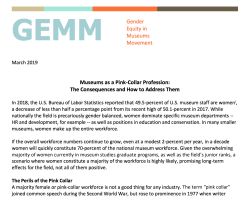Treading Water in the Museum Field
Posted: December 11, 2017 Filed under: Museum, museum career, Professional Development, Stay or go? | Tags: career, history museum, museums, nonprofit 2 Comments
This is the second in a series of guest posts about the museum job market. Our guest blogger this week is Cassidy Percoco, now a curator/collections manager, who graduated from the Fashion & Textiles History, Theory, and Museum Practice program at the Fashion Institute of Technology (NYC).
If you are interested in guest posting for Leadership Matters, particularly if you are looking for a first job or if your experience finding a museum job was impacted by race or gender, contact us at leadershipmatters1213@gmail.com.
Like many other people in the museum field, I had to spend years in a state of financial uncertainty after graduation. To me, that was all “paying your dues” – I knew that more was required beyond the degree and never expected to get a job right out of graduate school. However, it took me several years of living at home, working part-time in retail and food service, and interning and volunteering at local museums – not to mention writing a book and maintaining a blog on historical fashion – before an application and interview turned into a permanent, full-time job. And it’s a job I love, but for a variety of reasons, now I need to move up the ladder. At first, the second job seemed like it wouldn’t be too hard because it’s common knowledge that the lack of true entry-level jobs is the main barrier to a museum career, right?
Wrong. My current situation is actually not that much different than my post-grad-school one: There are few positions open for someone with my skills and experience, and competition is still extremely fierce. The standard advice of “volunteer as much as you can” is no longer practical, though. As a consequence, I’m not sure what to do next.
And I’m concerned there are a lot of people in the same position who aren’t speaking up or being talked about. Because we have jobs, we tell ourselves we shouldn’t complain, but opportunities for advancement are slim, and many of us have no idea what to do next, particularly since many of us well into a first job find ourselves tied through relationships to a particular region. Do we tread water? Explore ways to leave the field or move sideways into something else?
The entire system has problems, and while tackling degree creep is a good step toward breaking down barriers, the issues resonate through all levels of the museum world. We have an overload of applicants from multiplying graduate programs, while the number of positions in museum collections still has not rebounded from the belt-tightening of the Recession. Unfortunately, there is no easy answer: we need more jobs and better funding. Until we have them, we need to support each other in our choices – both those of us who leave and those of us who stay.
Cassidy Percoco
Cassidy Percoco, now a curator/collections manager, graduated from the Fashion & Textiles History, Theory, and Museum Practice program at FIT. She is the author of Regency Women’s Dress: Techniques & Patterns 1800-1830, and her blog and podcast can be found at www.mimicofmodes.com.










This couldn’t be any more applicable to my current situation. On top of what you mentioned, I essentially do not live in a large metropolitan area, and am unwilling to move. Granted, that personal choice is severely limiting, and I understand that is my fault. In addition, I am in education, which seems to have the least career mobility in the field. I do feel I am lucky to have anything, but am getting to the age where my experience does not match up with my job responsibilities, and creates a difficult situation at work with coworkers whose positions are not as museum or expertise driven, are less experienced, and do way less work for way more money. I’ve been applying for jobs for over two years and have come up against sexism, nepotsim, and downright lazy hiring practices. I think at this stage I am more willing to tolerate work that is less personally rewarding for a combination of mobility, a good experience match, and something more financially rewarding. I am wondering how to make the transistion out of the museum field, and am wondering what types of jobs or businesses/organizations/institutions would be willing to hire a career museum educator?
This post really spoke to me because I am also at that point in my career. A few years into my first full time job after school, ready for advancement and the next step, but it’s not possible to advance at my current institution. I have gradually taken on more responsibilities but that isn’t reflected in my title and there is only so far I can go, unless of course I want to wait 20 years for someone to retire.
I’ve been applying for jobs for about 18 months now and my problem so far has not been getting interviews. It’s finding a job that is a fit for me and that can pay enough, which is made more difficult because of bad hiring practices. With one interview, I had the job offered to me after a phone interview and an in-person, only to find that I would’ve had to take a 20% pay cut in order to take it, and of course there was no salary disclosed on the posting. It wasn’t a greed thing–I couldn’t pay my bills with what they were offering. With another, the entire in-person interview revolved around a set of duties that weren’t even in the job description but were apparently a major part of the job. I spent the whole time spitting and sputtering because I wasn’t prepared for the questions. The best part? A staff member apologized to me over the description and said he brought it up to the director, only to have his concerns dismissed.
It honestly makes me gun shy when applying to jobs. Situations like this can be embarrassing and are a waste of my precious vacation time (I have better ways to burn 2 days of leave). It’s also a major waste of an institution’s money. Between the flight, hotel, and everything else, I’d guess one museum spent $1,000 on me only for it to be a waste because they didn’t disclose their salary range on the job posting. We talk about how tight money is in the field, yet we have institutions throwing it away because they don’t follow simple, basic, common hiring practices for nearly every other field in the United States.
The opportunities are slim, yes, but it’s made even more difficult by bad and abusive HR/hiring practices that are standard operating procedure in this field. The, “It’s OK because we’re a non-profit” mentality needs to end. After my experiences over the last 18 months, it’s a bit of a sore spot if you can’t tell.